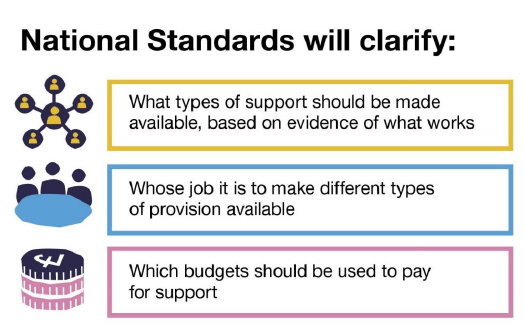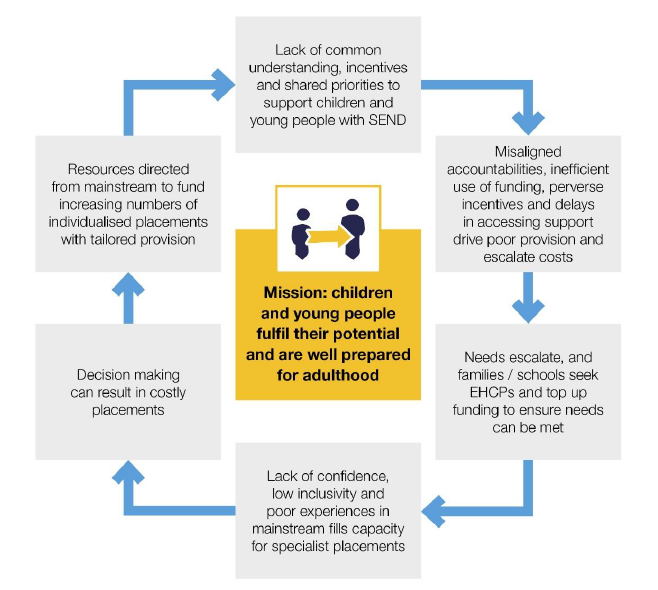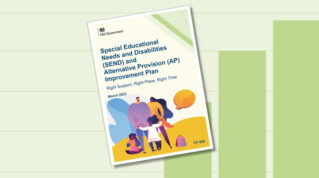Ministers finally published their special educational needs and disabilities improvement plan today, three years after the SEND review was first launched.
The government has pledged to go ahead with most major reforms. However a £70 million “change programme” – which will run for two to three years – will pilot proposed changes first, before they are finalised (full story here).
Nine regional expert partnerships, made up of three to four local authorities, will take part in the trial, reaching around 30 areas at first. It could increase to 50 to 60 areas during the programme.
The Department for Education will then decide on whether to go ahead with legislating proposed changes, and what they would look like. But it means finishing off many of the reforms has been punted beyond the next election.
Here’s what you need to know *about the new policies* announced in the government’s improvement plan…
1. National standards (not until 2025 at earliest)
Ministers had proposed legislating for new national SEND standards. But these standards are now going to be piloted through the change programme first, before legislation is decided on.
So from spring, parents and “frontline professionals” will be among those ministers talk to on how the standards could look.
By the end of this year, government will “start testing some elements” of the standards with the regional expert partnerships.

Then by the end of 2025, “a significant proportion” of the standards will be published, “with a focus on those that are most deliverable in the current system”.
Government intends to “underpin the standards with legislation for education at the earliest opportunity to facilitate intervention in education settings if standards are not met”.
2. Accountability to ‘ensure expectations met’
Ministers will also look at designing accountability mechanisms “to ensure the government expectations are met, including considering the role of Ofsted and the Care Quality Commission”.
The standards could set out how schools must adapt physical and sensory environments to enable pupils with SEND to learn alongside peers, as well as the council’s role in supporting this.
Clear standards for universal and SEN support provision (so those without an education, health and care plan) will enable “better accountability at this stage”.
As committed, DfE will also consult on an amended version of the SEND Code of Practice.
3. EHCPs to go digital – but trialled first
DfE is going ahead with plans to create a standardised EHCP template, but guidance won’t be in place from 2025. It will “consider the case for mandating its use through legislation”, but will “encourage” councils to adopt the template.
On plans for a digital EHCP, this year DfE will work with councils, suppliers and families to test how “digital solutions might best improve their experiences of the EHC process”.
In 2024 they will design digital solutions and testing drafts, before beginning “rollout of requirements” across councils in 2025.
4. Inclusion plans in, but no council admission powers
Government is going ahead with “local inclusion plans” (LIPs), created by local SEND and AP partnerships. Non-statutory guidance will be published this autumn on expectations for the partnerships, alongside a “self-assessment tool”.
In 2024, the change programme’s regional taskforce teams will target support to areas most in need. The DfE’s regions groups will work with the local partnerships to develop and agree LIPs by the end of 2024.
From 2025 onwards, government will introduce primary legislation at the “next available opportunity” to put make partnerships statutory.
Controversial “tailored lists” of settings for children will also first be tested in the change programme. DfE heard “significant concerns” from parents and young people that it could “restrict choice”.
DfE say these lists will only be introduced in an area once the LIP has been “quality assured” and signed off by the region groups as meeting the national standards.
Previously proposals to give councils the teeth to enforce this with “backstop powers” to direct academies to admit children, though, were part of the now axed schools bill.
5. Mandatory mediation to be scoped out first
Ministers had controversially proposed to make mediation between councils and families during the EHCP process mandatory. Currently thousands of appeals go to the first-tier tribunal with some parents waiting up to a year for help, as Schools Week revealed.
The move will be tested through the change programme to ensure there are no “unintended consequences for families”. It will look at options to “strengthen mediation” before deciding whether to bring forward legislation.
This year it will work with organisations such as the Civil Mediation Council, the College of Mediators as well as families to review and build on professional standards for mediators.
It will improve mediation advice for families and evaluate the outcomes and impacts of the process.
Next year, it will “clearly set out” what processes should be followed locally and say how the mediation process “will be monitored to give families confidence in it”.
6. New NPQ for SENCos gets green light
Ministers will go ahead with plans to introduce a new leadership level SENCo National Professional Qualification. Further timings on procuring NPQ providers will be released “in due course”.
This year, the DfE will also “explore opportunities” to build teacher expertise through a review of the initial teacher training core content framework and early career framework.
By the end of 2025, the DfE will publish three of its new practice guides to “equip frontline professionals with the skills and expertise to make best use of provision and to identify needs early, accurately, and consistently”. The first three will focus on advice for mainstream schools.
The guides will also meet the green paper commitment to set out clear guidance on the effective use and deployment of teaching assistants for pupils with SEND.
A key aspect of this will be our SEND and alternative provision practice guides, which
will equip frontline professionals with the skills and expertise to make best use of
provision and to identify needs early, accurately, and consistently

The government is also commissioning a research project on using TAs to develop an “evidence base” of best practice. The Department of Health and Social Care and the DfE will work together to “take a joint approach to workforce planning”.
A steering group will be created this year, and feed into the National SEND and AP Implementation Board. The work will be completed by 2025. The AP specialist taskforce pilot has been extended until March 2025.
7. New special schools – but long process
Thirty-three free schools have been promised in 30 councils, mainly those with large high needs deficits. New AP schools applications are currently being assessed and announced in autumn.
But as a Schools Week investigation found, it can take years for these schools to open. In September, one of 37 schools had opened in a permanent home two years after they were promised.
Schools Week also revealed the special school places crisis, and that DfE doesn’t collect the data on how full up these schools are.
DfE commits again to collect this from councils this summer as well as forecasts of the number of specialist placements councils expect to make in SEN units, special schools and AP.
8. National SEND tariffs to come alongside standards
The SEND review also proposed a national system of funding bands and tariffs for pupils with special needs to ensure more “consistent” funding.
This will go ahead, with bandings clustering “specific types of education provision” and tariffs setting the rules and prices that commissioners use to pay providers.
No specific dates for implementation were provided, just a pledge it will be “alongside our broader changes to the national funding system and the development of national standards”.
The new system will give providers “clarity on how much funding they should expect to receive in delivering support or a service and enable commissioners to determine the funding required”.
9. AP funding will also be reviewed
The green paper proposed a new funding approach in alternative provision. Local partnerships would identify the budget needed to implement their plans over a minimum period of three years.
Government said it will go ahead with the new funding approach “aligned to their focus on preventative work with, and reintegration of pupils into, mainstream schools”.
This will be done in consultation with the sector, but no dates were included.
10. Inclusion dashboard demo next month
The SEND review pledged new “inclusion dashboards” for 0 to 25 provision to offer a “timely, transparent picture” of how the system is performing at local and national level for “strengthened accountability and transparency to parents”.
A prototype will be tested from this April “with a view to making a fully public version available in autumn 2023”.
However, where new mandatory data collections are proposed, they will be assessed to check if they are “genuinely necessary, non-duplicative, comparable and coherent with all other data collections”.
The DfE also said its ongoing academies regulation and commissioning review will set out detailed descriptors for academy trust strength, including measures of inclusion.
11. ‘Adjusted’ intervention in failing areas
A new “ladder of intervention” will come into effect this year, with “robust action for all where statutory duties for children and young people with SEND and in alternative provision are not met, to strengthen accountabilities across all parts of the system”.
The DfE will “adjust” its response to poor performance in line with the new Ofsted and Care Quality Commission area SEND inspection framework. This will allow it to “act proactively” where areas fail, including by removing service control and imposing a trust or commissioner on councils.
12. New AP performance framework
An expert group will support the development of a “bespoke national alternative provision performance framework” based on five named metrics.
This will set “robust standards focused on aspects such as increased attendance, attainment, re-integration into mainstream education or progression to sustainable post-16 destinations”.
13. Fair access panels review
Government will also review processes and develop options for ensuring “transparent and effective movement of pupils without EHCPs, such as those requiring alternative provision, to address behavioural needs”.
This work will include arrangements for fair access panels, and will be in line with the new national standards “around the role of specialist and mainstream schools in making arrangements for alternative provision”.
Where a school place has not been secured through fair access, government will look at how it can make the process of applying for a direction to admit as “effective as possible”.
14. ‘Comparable’ expectations for independent schools
Government will also “re-examine the state’s relationship with independent special schools to ensure we set comparable expectations for all state-funded specialist providers”.
Working with the sector, government will consider how these expectations should be aligned with the new national standards.
This will mean that independent specialist providers “should be part of local authorities’ strategic planning and that decisions about changes to the supply of their provision should be made through local inclusion partnerships”.
Schools Week has revealed how rising demand means councils now spending hundreds of millions of pounds sending pupils to costly private schools.
15. More ‘joined-up’ work with NHS England
Integrated care boards will be required to have a named executive board member lead accountable for SEND, and there will be more “joined-up” responses between the DfE and NHS England to improve outcomes and experiences.
The government also said it would “strengthen redress for individual disagreements by clarifying who is responsible for resolving complaints and undertaking further testing of effective mediation approaches”.
16. Implementation board will drive reforms
The green paper proposed a new national SEND and alternative provision implementation board to “hold partners to account for the timely development and improvement of the system”.
This will be established and comprise of parents, sector leaders across education including schools, early years and post-16, health and care and local and national government. Its joint chairs will be the children’s minister and mental health minister.
The board will oversee the implementation of the improvement plan, receive “regular input from a wide range of stakeholders” and will publish “updates on progress”.

















Your thoughts